Dagstuhl-Seminar 19391
Data Ecosystems: Sovereign Data Exchange among Organizations
( 22. Sep – 27. Sep, 2019 )
Permalink
Organisatoren
- Cinzia Cappiello (Polytechnic University of Milan, IT)
- Avigdor Gal (Technion - Haifa, IL)
- Matthias Jarke (RWTH Aachen, DE)
- Jakob Rehof (TU Dortmund, DE)
Kontakt
- Michael Gerke (für wissenschaftliche Fragen)
Impacts
- Knowledge-Driven Data Ecosystems Toward Data Transparency : article - Geisler, Sandra; Vidal, Maria-Esther; Capiello, Cinzia; Farias Loscio, Bernadette; Gal, Avigdor; Rehof, Jakob; Pernici, Barbara; Paja, Elda; Otto, Boris; Missier, Paolo; Lenzerini, Maurizio; Jarke, Matthias - New York : ACM, 2021. - pp 1–12 - (Journal of Data and Information Quality ; 14. 2022, 1).
- Knowledge-driven Data Ecosystems Towards DataTransparency : article - Geisler, Sandra; Vidal, Maria-Esther; Capiello, Cinzia; Farias Loscio, Bernadette; Gal, Avigdor; Rehof, Jakob; Pernici, Barbara; Paja, Elda; Otto, Boris; Missier, Paolo; Lenzerini, Maurizio; Jarke, Matthias - Cornell University : arXiv.org, 2021..
It is generally agreed that infrastructures for secure and reliable data exchange among organizations is a key technological enabler for digitalization and the digital economy of the future. In this context organizations (rather than individuals) are regarded as sovereign data owners entering into data ecosystems according to agreed contracts between parties. The data sharing networks of the future will enable ecosystems of data providers, data consumers, and service providers.
The creation of suitable infrastructures for data ecosystems and sharing networks poses many technological and scientific challenges cutting across a wide range of scientific specializations. The Dagstuhl Seminar aims at bringing together researchers from different communities within computer science (but including also relevant legal, ethical, and societal aspects) to exchange ideas pertaining to the central scientific challenges within this emerging interdisciplinary field of data ecosystems and data sharing networks.
A central new aspect of data ecosystems such as will be considered in the seminar lies in the view of data as something representing intrinsic value and which may therefore also be considered an economic value. In the data ecosystem as understood here, data is typically considered both a business asset and a business commodity which may be priced and sold in some form or other according to contract, e.g. in the form of a data provisioning service with a defined service level, or as raw data with certain defined conditions of use, or as a specified analytic service, etc. This view may be contrasted with the more traditional view of data as an instrument towards the creation of value.
The seminar will be structured around the following topic areas:
- Data engineering, with a focus on continuous and incremental data integration
- Architecture topologies, with a focus on usage control and data protection
- Ecosystem design, with a focus on data valuation and data quality
- Use cases and business models
The distinct perspective on the topics of the seminar arises out of their relevance for contributing to the understanding of data ecosystems in the digital economy of the future.
 Cinzia Cappiello, Avigdor Gal, Matthias Jarke, and Jakob Rehof
Cinzia Cappiello, Avigdor Gal, Matthias Jarke, and Jakob Rehof
The design of data ecosystems, infrastructures for the secure and reliable data exchange among organizations, is considered as one of the key technological enablers for digitalization and the digital economy of the future. Several applied research initiatives and industry consortia provide substantive evidence of this trend e.g., the Industrial Internet Consortium (IIC)formed in the USA, the Industrial Data Space (IDS) founded in Germany and the associated consortium International Data Space Association (IDSA)2. Most of these initiatives aim to provide a reference architecture for dealing with (i) governance aspects related to the definition of policies and conditions able to norm the participation to the data ecosystem, (ii) security aspects related to the definition of policies and infrastructures for guaranteeing a trusted and secure exchange of data, (iii) data and service management aspects related to representation models and exchange formats and protocols, and (iv) software design principles related to the realization of the architectural components and their interaction.
All these aspects have been discussed in the seminar and the main findings are described in this report. In addition, a central new aspect of data ecosystems that we considered in the seminar lies in the view of data as having an economic value next to its intrinsic value to support operational and decisional core business activities. This means that in the data ecosystem, data is typically considered both a business asset and a business commodity which may be priced and sold in some form (e.g., data provisioning service or raw data) according to contracts.
As testified by the amount and variety of problems described above, the creation of such ecosystems poses many challenges cutting across a wide range of technological and scientific specializations. For this reason, the seminar involved researchers from different communities. Interdisciplinary discussions gave the possibility to analyze different perspectives and to achieve valuable outcomes presented in this report, such as a wide set of research challenges and the definition of interesting use cases for the further development of data ecosystems. Details about the activities carried out during the seminar are provided in the following.
Overview of the activities
The seminar took place from Monday September 23 until Friday September 27. The seminar program encompassed four invited talks (keynotes and tutorials) on the first day (Sep. 23rd), by Gerald Spindler (law and ethics), Frank Piller (ecosystems and business models), Maurizio Lenzerini (data integration), and Boris Otto (International Data Space). After discussions related to the talks and tutorials, the remaining afternoon was spent structuring (through joint discussion) the coming days of the seminar and group structure. As a result, group structure was based on a thematic structure encompassing three groups, one for each of the topic areas Business, Data, and Systems. Tuesday Sept. 24 began with a breakout into groups and election of scribes in each of the three groups (Business, Data, and Systems), and the remainder of the day was taken up by parallel group sessions in the three groups. Wednesday Sept. 25 began with a joint session where each of the groups presented their work, which was then discussed jointly. The afternoon (until the excursion) was taken up by joint discussion on report structure. The morning of Thursday Sept. 26 encompassed joint discussion on a proposed joint manifesto as well as group discussions on application domains and application scenarios (topic areas were Health, SmartCities, Industry 4.0). The afternoon was taken up by continued group discussions and ended with group presentations and joint discussion on application domains and application scenarios. There was also further discussion on report structure at the end of the day. The manifesto was subject to very lively discussion in the evening, after dinner. Friday Sept. 27, the last day of the seminar, was devoted to wrap-up (conclusions, summary, and report process) followed by joint discussion on relations between Systems, Data and Business views on the overall topic of the seminar.
The outcome of the seminar, which is documented in the remainder of this report, encompasses summaries of the group discussions and the joint manifesto.
 Cinzia Cappiello, Avigdor Gal, Matthias Jarke, and Jakob Rehof
Cinzia Cappiello, Avigdor Gal, Matthias Jarke, and Jakob Rehof
- Cinzia Cappiello (Polytechnic University of Milan, IT) [dblp]
- Ugo de' Liguoro (University of Turin, IT) [dblp]
- Yuri Demchenko (University of Amsterdam, NL) [dblp]
- Elena Demidova (Leibniz Universität Hannover, DE) [dblp]
- Boris Düdder (University of Copenhagen, DK) [dblp]
- Bernadette Farias Lóscio (Federal University of Pernambuco - Recife, BR) [dblp]
- Avigdor Gal (Technion - Haifa, IL) [dblp]
- Sandra Geisler (Fraunhofer FIT - Sankt Augustin, DE) [dblp]
- Benjamin Heitmann (Fraunhofer FIT - Aachen, DE & RWTH Aachen, DE) [dblp]
- Fritz Henglein (Univ. of Copenhagen, DK & Deon Digital - Zürich, CH) [dblp]
- Matthias Jarke (RWTH Aachen, DE) [dblp]
- Jan Jürjens (Universität Koblenz-Landau, DE) [dblp]
- Maurizio Lenzerini (Sapienza University of Rome, IT) [dblp]
- Wolfgang Maaß (Universität des Saarlandes - Saarbrücken, DE) [dblp]
- Paolo Missier (Newcastle University, GB) [dblp]
- Boris Otto (Fraunhofer ISST - Dortmund, DE & TU Dortmund, DE) [dblp]
- Elda Paja (IT University of Copenhagen, DK) [dblp]
- Barbara Pernici (Polytechnic University of Milan, IT) [dblp]
- Frank Piller (RWTH Aachen, DE) [dblp]
- Andreas Rausch (TU Clausthal, DE) [dblp]
- Jakob Rehof (TU Dortmund, DE) [dblp]
- Simon Scerri (Fraunhofer IAIS - Sankt Augustin, DE) [dblp]
- Julian Schütte (Fraunhofer AISEC - München, DE) [dblp]
- Egbert Jan Sol (TNO - Eindhoven, NL) [dblp]
- Gerald Spindler (Georg August Universität - Göttingen, DE) [dblp]
- Maria-Esther Vidal (TIB - Hannover, DE) [dblp]
Klassifikation
- data bases / information retrieval
- security / cryptology
- software engineering
Schlagworte
- Data ecosystems
- data supply chains
- sovereign and secure data exchange among organizations

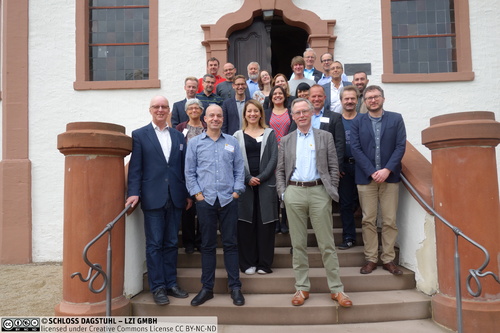
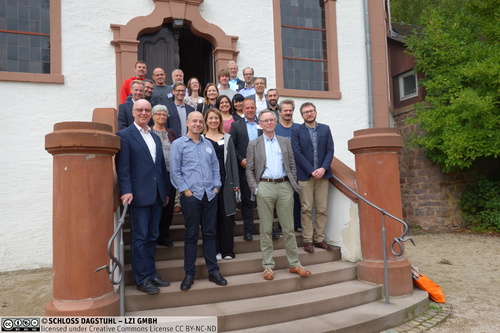
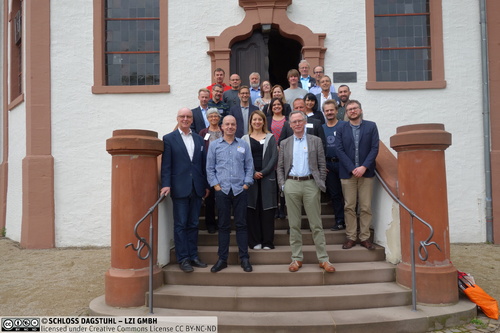
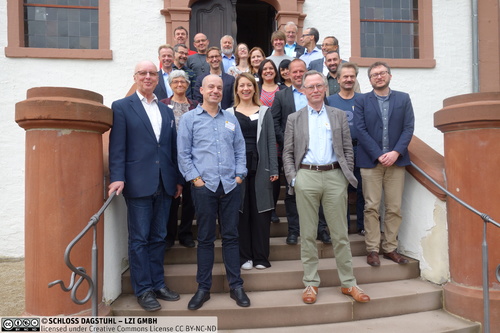
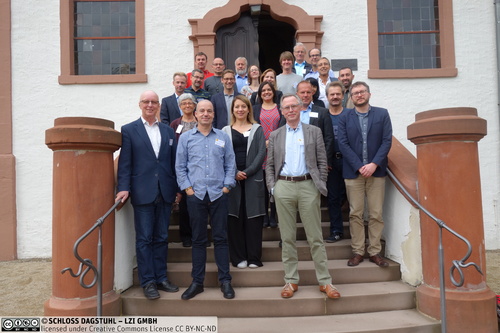
 Creative Commons BY 3.0 DE
Creative Commons BY 3.0 DE
